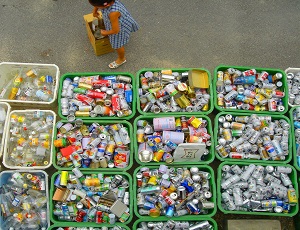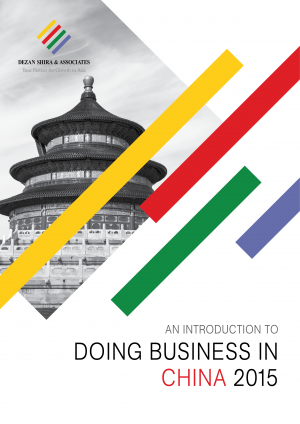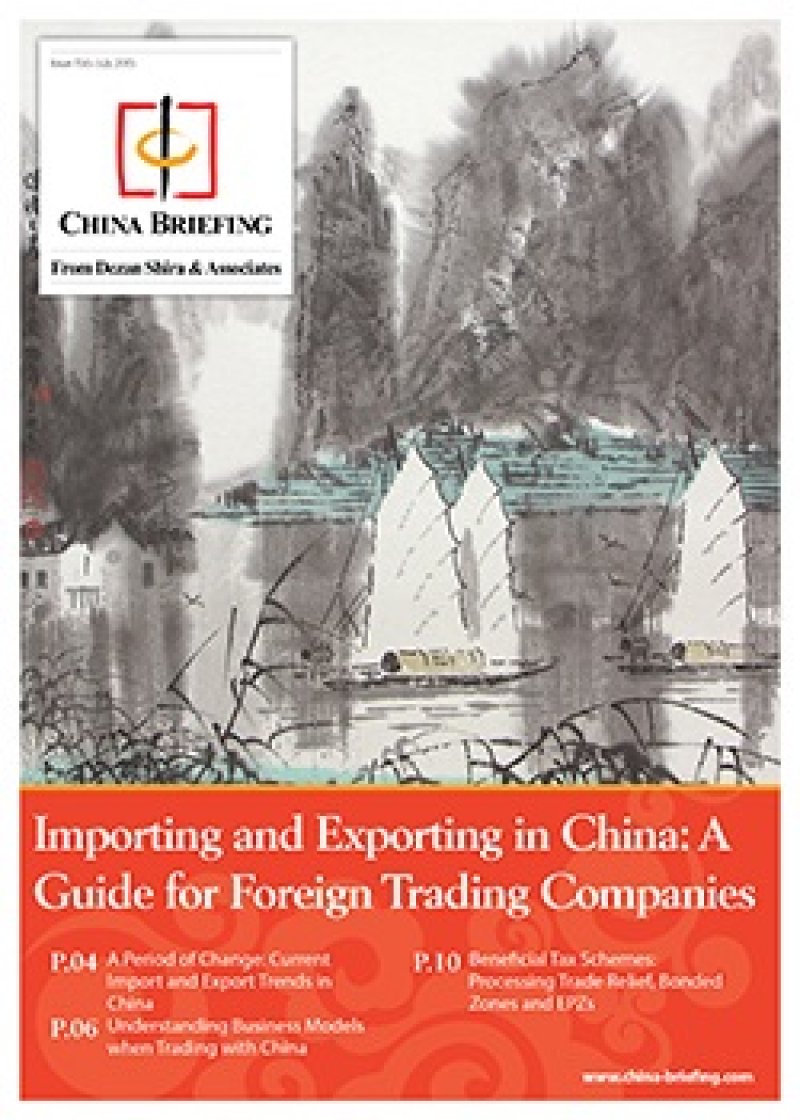Trash or Treasure? Prospects for China’s Recycling Industry
 By Alexander Chipman Koty
By Alexander Chipman Koty
As leadership in Beijing promotes a more responsible and sustainable environmental policy, it will have to reign in and regulate its massive – but largely informal – recycling industry to achieve genuine progress. China’s notorious pollution and frequent environmental scandals resulting from the country’s breakneck industrialization have given it a black eye both at home and abroad. Environmental concerns are the biggest cause of public protests in China and provide fodder for international criticism. However, China’s government under President Xi Jinping has repeatedly signaled a desire to be a global leader in climate change, most recently at December 2015’s COP21 conference and in its 13th Five Year Plan covering the years 2016-2020.
In order to make good on these commitments, Beijing must reform and regulate the country’s recycling industry, which operates chiefly informally with limited government oversight. Doing so not only requires stricter government enforcement, but investment in foreign technology and expertise to develop urban recycling facilities and modern treatment and reprocessing practices. Standardizing the recycling industry presents considerable challenges to the public and private sectors in China, but is socially and economically essential for creating more efficient and environmentally friendly waste renewal processes as China enters its post-boom era.
Overview of China’s Recycling Market
Recycling
In the West, recycling is generally thought of as a civic, responsible, and green activity. In China, however, recycling is a market-driven economic activity galvanized by securing cheap commodities for manufacturers. China’s recycling industry employs more people than any other industry except for agriculture. It is estimated that migrant workers collect over 90 percent of bottles in Beijing. This army of informal recyclers generally prefer to remain anonymous from the government and do not pay taxes. They are often seen bicycling through cities with makeshift trailers collecting recyclables from garbage cans, recycling bins, and litter on the streets. Collectors regularly make arrangements with security guards from office buildings and owners of small businesses and restaurants to collect their recyclables. Although these collectors effectively fill the gap left by underwhelming public services, considerable amounts of recyclables still end up in the dump. Furthermore, when the price of oil and other commodities is low, there is less demand for recycled resources, and recyclables can end up piled in landfills.
Reprocessing
Once collected, recyclables are sold to workshops for reprocessing. While there are many large licensed reprocessing facilities, the industry is dominated by small family-run enterprises. These small workshops offer several advantages over their larger competitors. Their size allows them to develop highly specialized and niche services, making them the go-to destination for specific recyclables within their networks. Further, their business costs are far lower than licensed facilities due to their total disregard of safety and environmental concerns. Licensed companies must responsibly dispose of excess non-recyclable waste, while unregulated firms burn anything that cannot be recycled or dump them nearby in improvised landfills. These unregulated practices pollute heavily and often destroy local land and waterways while introducing serious health issues to workers and their communities. But on the other hand, it offers a base from which a comprehensive system could potentially be developed.
![]() RELATED: Business Advisory Services from Dezan Shira & Associates
RELATED: Business Advisory Services from Dezan Shira & Associates
Waste Incineration
While there are opportunities for greater and more efficient recycling in China, the country is turning to controversial incineration plants to deal with its enormous waste buildup. According to the Chinese government, there is up to seven billion tons of waste buried around the country’s major cities. The city of Shenzhen is tackling this problem by building the world’s largest waste-to-energy incineration plant. The plant is expected to burn 5,000 tons of waste a day, converting a third of that into useable electricity. Although the plant produces energy and adds a renewable component with its solar panel rooftop, incineration plants release vast amounts of CO2 into the atmosphere – and China plans to build 300 of them over the next three years.
Despite easing the burden of overflowing landfills and the greenhouse gases they emit, they will not solve the root problem of inefficient recycling and waste management practices and will continue to draw the ire of local populations worried about the environment. For example, plans to build an incinerator in Guangdong were scrapped after mass protests in April 2015. Nonetheless, Beijing seems to recognize the necessity to reduce waste, as it announced the creation of pilot urban mining facilities in dozens of cities to extract usable material from waste.
Stricter Regulations on Imported Recyclables
The Chinese government has been making efforts to gradually clamp down on the industry’s biggest polluters and to standardize the recycling process. In 2013, Beijing announced Operation Green Force, a campaign introducing regulations to imported recyclables. Because of China’s cheap labor, lax environmental safety standards and appetite for affordable commodities to supply its vast manufacturing sector, the country imports by far the most scrap and waste in the world. In fact, the U.S. exports more scrap and waste to China than any other product. However, since Operation Green Force launched, China no longer accepts highly contaminated waste. This makes exporting dirty waste less beneficial, as countries can no longer freely rid themselves of their dirtiest refuse and have to pay demurrage fees while their containers are stored in port awaiting inspection. Minimum output regulations and the suspension of licenses for importers of dirty recyclables have also caused the closing of some small workshops reliant on inefficient and polluting dirty recycling.
![]() RELATED: China’s New Environmental Protection Tax
RELATED: China’s New Environmental Protection Tax
Investment Opportunities and Market Access
In addition to stricter regulations, Beijing is likely to invest heavily in promoting greener practices and cleaning the country’s environment. China’s Ministry of Environment reportedly estimates that up to RMB 17 trillion (US$2.6 trillion) could be allocated to environmental protection projects in the 13th Five Year Plan, up from RMB 5 trillion (US$766 billion) in the previous five-year plan. These efforts could potentially benefit several recycling-related industries that are already encouraged for investment according to the “Catalogue for the Guidance of Foreign Investment Industries (2015)”, including the following:
- Development and manufacturing of recyclable building materials;
- Recycling of building waste;
- Manufacturing of plastic, electrical appliance, rubber, battery, and textile recycling equipment;
- Development of unconventional water treatment and recycling equipment; and
- Recycling of electrical and electronic products, automobiles, rubber, metal, and batteries.
As such, recycling and waste processing are industries with huge growth potential in China, in particular for foreign technology and expertise. Only five percent of China’s construction waste is recycled, in stark contrast to 90 percent in the European Union and 97 percent in Japan and South Korea. Similarly, in 2012 only 11 percent of China’s crude steel production and 21 percent of its aluminum production was from recycled material, compared to 59 and 57 percent in the U.S., respectively. Greater efforts in sectors such as these could drastically cut emissions, reduce waste, and produce affordable commodities.
China will continue to be the world’s leading destination for waste in the short term, though its slowing manufacturing sector, a cheap commodities market, stricter rules, and a more regulated domestic recycling program should lessen opportunities for exporters of waste in the medium to long term. In contrast, China’s demand for foreign technology and consulting in the recycling industry is poised to increase as leadership responds to pressure to address the country’s rampant pollution.
Ultimately, the government will have to play an active role in this industry that doubles as a civic service and where profit margins are often precariously thin, but where there is potential for considerable social and economic benefits.
|
Asia Briefing Ltd. is a subsidiary of Dezan Shira & Associates. Dezan Shira is a specialist foreign direct investment practice, providing corporate establishment, business advisory, tax advisory and compliance, accounting, payroll, due diligence and financial review services to multinationals investing in China, Hong Kong, India, Vietnam, Singapore and the rest of ASEAN. For further information, please email china@dezshira.com or visit www.dezshira.com. Stay up to date with the latest business and investment trends in Asia by subscribing to our complimentary update service featuring news, commentary and regulatory insight. |

 An Introduction to Doing Business in China 2015
An Introduction to Doing Business in China 2015
Doing Business in China 2015 is designed to introduce the fundamentals of investing in China. Compiled by the professionals at Dezan Shira & Associates, this comprehensive guide is ideal not only for businesses looking to enter the Chinese market, but also for companies that already have a presence here and want to keep up-to-date with the most recent and relevant policy changes.
 Selling, Sourcing and E-Commerce in China 2016 (First Edition)
Selling, Sourcing and E-Commerce in China 2016 (First Edition)
This guide, produced in collaboration with the experts at Dezan Shira & Associates, provides a comprehensive analysis of all these aspects of commerce in China. It discusses how foreign companies can best go about sourcing products from China; how foreign retailers can set up operations on the ground to sell directly to the country’s massive consumer class; and finally details how foreign enterprises can access China’s lucrative yet ostensibly complex e-commerce market.
Importing and Exporting in China: a Guide for Trading Companies
In this issue of China Briefing, we discuss the latest import and export trends in China, and analyze the ways in which a foreign company in China can properly prepare for the import/export process. With import taxes and duties adding a significant cost burden, we explain how this system works in China, and highlight some of the tax incentives that the Chinese government has put in place to help stimulate trade.
- Previous Article Funding WFOEs in China: Critical Points on Pre-Incorporation Expenses and Thresholds
- Next Article China Investment Roadmap: the e-Commerce Industry – New Issue of China Briefing Magazine









